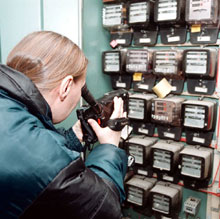He expects a cold reception, especially because a July 1 rise in energy prices is probably not the last increase these customers face – and they know that. Across Bulgaria, the spiking cost of energy is driving pensioners, the poor and many of the working class citizens who make up much of Bulgaria to anger. An inspector films electricity meters in Stolipinovo district
An inspector films electricity meters in Stolipinovo district
Energy companies say they must collect the money owed them if they are to be self-supporting. That attitude does not give dispensation to the poor in places like Plovdiv. Power companies worried about their bottom line are thus pitted against some of Bulgaria’s poorest citizens, who have traditionally received energy from the state for free or at steeply discounted rates.
As Shutov’s team prepares to disconnect the electricity from a local house, the local people argue.
“How do we pay for electricity?” demands Stefan Ivanov, 23, in line for disconnection. Stefan, like many local residents, lives only on a stipend of €32 per month from state aid.
“I have four children. Look at my apartment. It has just one room. I don’t even have windows and you want me to pay bills for electricity?”
Stefan appeals for support from a crowd of local residents who have gathered. The situation is tense. Police started escorting power company employees after a near riot last year when more than 200 residents who had lost power threatened two energy company employees with sticks.
Energy company officials say residents of Stolipinovo owe the Power and Distribution Company of Plovdiv €3 million. The company says so many residents do not pay their bills that they had to begin sending in collection agents like Shutov.
Residents here and in other communities have not paid regularly for utility services for years and have gotten away with it. But now, energy companies across the region are cracking down on delinquent bill payers, and a new policy calls for shutting off power if a bill is more than one week late. For many, that will mean the lights will go out.
The problem will get worse after Jan. 1 when the nuclear plant in Kozlodui, the major source of Bulgarian electricity, is scheduled to shut down two nuclear-powered generators the EU considers unsafe. Competition for cheap Eastern European energy from the EU when Bulgaria joins the union is also likely to raise prices, as will badly needed investment in the aging Bulgarian power grid. Experts expect prices to rise by another one-third.
Shutov is at the flashpoint.
“You receive state aid to pay your electricity, don’t you?” Rumen Dimitrov, the spokesman of the electric company asks Stefan.
Yes, he answers. But he is paid up, argues the young man.
“Some people passed by and collected 20 leva from each family. I took a loan from the creamery. I stay there during the day because it’s warm. We heat with garbage; we do not use electricity,” he said.
Another man shouts from the crowd: “We are not lazy, but there is no work. Give us sub-machine guns. We’ll shoot. We’ll become hired assassins if we have to, to make some money to pay our debts.”
Ibrahim Hasan’s family is one of more than one dozen in Stolipinovo without electricity. He hadn’t paid for two years, and only days ago, his electricity was cut off.
“If I had some income I would pay, but I live on welfare and I can’t,” he explains while walking to his house. Through the window a candle burns. His daughter Emel is trying to do her homework.
While Ibrahim’s neighbors still have electricity, he doesn’t expect that to be true for long as their electric meters have been moved to high poles next to the house to discourage theft.
“Very soon they will also be using candles,” Ibrahim says.
Deep mistrust between Roma and non-Roma Bulgarians exacerbates the problem here. Deserved or not, Roma have a reputation among many Bulgarians for being non-cooperative and for criminal behavior.
“By switching off the electricity, we do not solve the problem. If just for three days we stop the electricity in these Gypsies’ quarters, they will never light up again. Our technical devices will be stolen immediately,” said a power company engineer.
Besides the Roma, pensioners have been particularly hard hit by the price increases. “I can’t see how, with my pension and with no state aid for electricity, I could pay higher and higher prices. It is impossible,” says Ivan Nikolov.
Nikolov, a former plumber, had to pay a €55 bill for electricity last winter. He and his wife Verka live on a pension of €70.
“How will we pay the bills next winter when the prices will be 10 percent higher?” Nikolov said. “There is nothing left to be done except to switch it off and to freeze.”





